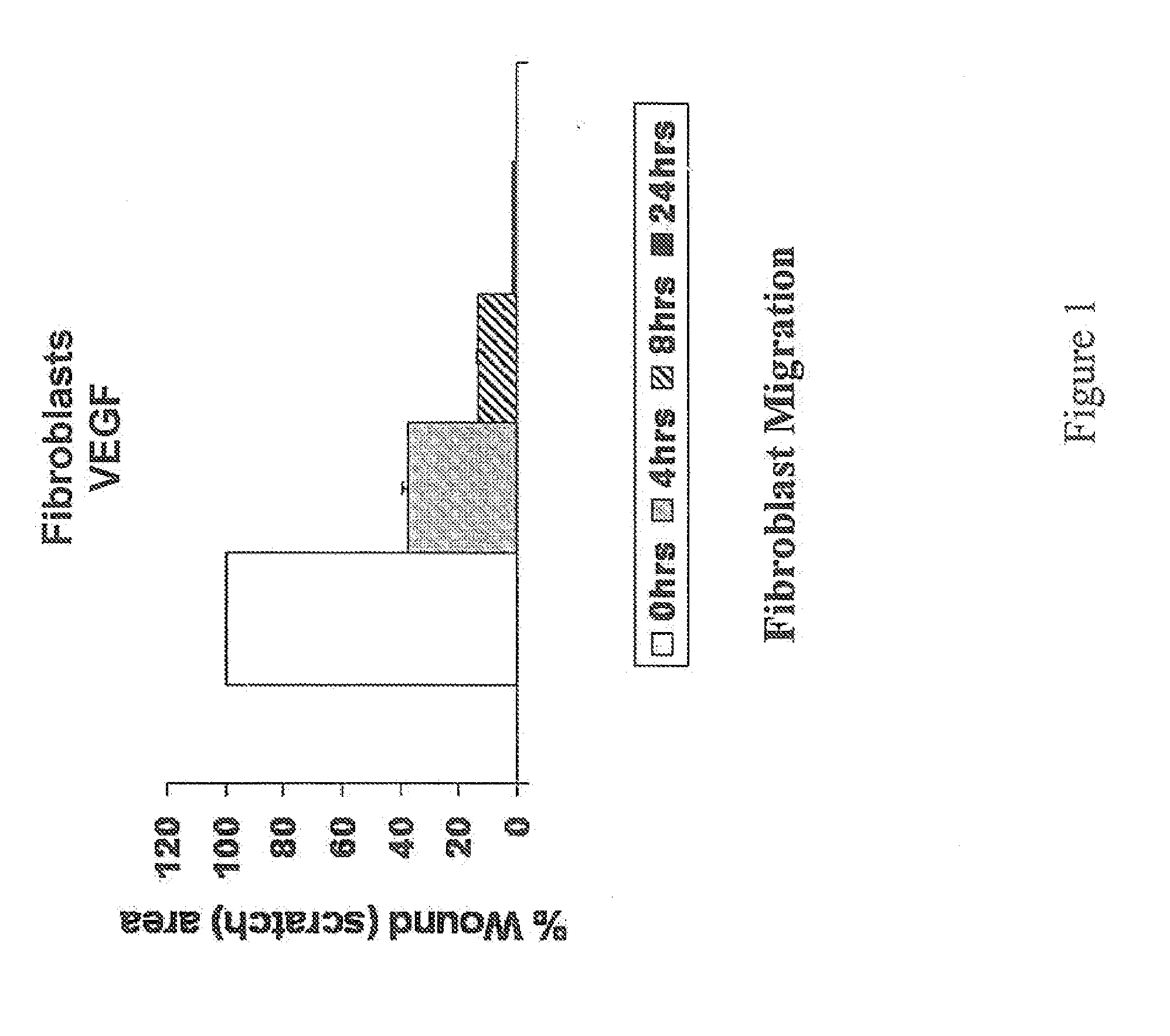Growth factor mediated cosmeceuticals and use thereof to enhance skin quality
a growth factor and cosmeceutical technology, applied in the direction of biocide, drug composition, peptide/protein ingredients, etc., can solve the problems of harmful combination, achieve the effect of increasing collagen deposition, promoting the migration of activated cells, and increasing the migration of keratinocytes
- Summary
- Abstract
- Description
- Claims
- Application Information
AI Technical Summary
Benefits of technology
Problems solved by technology
Method used
Image
Examples
example 1
Non-Angiogenic Mechanism of VEGF Stimulation of Keratinocyte and Fibroblast Migration
[0120]Human Recombinant VEGF Stimulates Only the Epidermal Cells (Keratinocytes) that have Regenerative Potential
[0121]To test the effects of VEGF on epithelialization, which is very important in cosmetology especially for laser resurfacing, recombinant VEGF was tested using an in vitro scratch model to measure keratinocyte migration. When normal human keratinocytes grown in a tissue culture dish are “wounded” by a scratch, they migrate over the scratch to close the gap. This approach was used to test how VEGF effects keratinocyte migration and proliferation.
[0122]Materials and Methods
[0123]Primary human keratinocytes were incubated in the presence and absence of recombinant VEGF. Keratinocyte migration was observed during a 48 hr period. Epidermal Growth Factor (EGF) was used as a positive control because it is a well established stimulant of both keratinocyte migration and proliferation. Cells wer...
example 2
VEGF Enhances Skin Healing in Experimental Models as Measured by Tensile Properties of the Skin and Increased Epithelialization
[0134]Materials and Methods
[0135]Using methods and materials as described above with respect to VEGF local sustained release of VEGF using adenoviral vector mediated gene transfer reversed the reduced angiogenic response observed in diabetic wounds and accelerated wound healing. This was tested by determining the specific effects of VEGF165 application on all components of the wound healing process: epithelialization, skin biomechanical properties, histology, and time to 100% wound closure. To determine the effects of VEGF on wound healing in vivo, ADV / VEGF165 and controls (vehicle and saline) were injected into excisional and incisional wounds created on dorsum of BKS.Cg-m+ / +Leprdb and NOD mice and mechanical properties and histological evaluations were performed 10, 14 or 21 days post injury.
[0136]Linear incisional wounds were created on the dorsum of 57 f...
example 7
VEGF Induces Collagen Formation with Alignment of Fibers
[0154]One of the contributing factors to wrinkle formation is loss of alignment in collagen fibers. To test if the VEGF-mediated collagen deposition is properly aligned, Sirius red staining with polarized light microscopy was employed on the three treatment groups of Example 6.
[0155]Saline treated control wounds showed modest birefringence intensity from organized collagen fibers. These collagen fibers were short, thin and arranged in a random pattern. The greenish-yellow birefringence of these collagen fibers was typical of young immature granulation tissue. The red birefringence on the surface of the granulation tissue was from the keratin laid-down by keratinocytes within the epidermal cell layer. There was little collagen deposited in these saline treated mice and that newly deposited collagen was poorly organized. Empty viral particles treated wounds show an increase in the greenish-yellow birefringence intensity, where co...
PUM
| Property | Measurement | Unit |
|---|---|---|
| time | aaaaa | aaaaa |
| diameter | aaaaa | aaaaa |
| diameter | aaaaa | aaaaa |
Abstract
Description
Claims
Application Information
 Login to View More
Login to View More - R&D
- Intellectual Property
- Life Sciences
- Materials
- Tech Scout
- Unparalleled Data Quality
- Higher Quality Content
- 60% Fewer Hallucinations
Browse by: Latest US Patents, China's latest patents, Technical Efficacy Thesaurus, Application Domain, Technology Topic, Popular Technical Reports.
© 2025 PatSnap. All rights reserved.Legal|Privacy policy|Modern Slavery Act Transparency Statement|Sitemap|About US| Contact US: help@patsnap.com

